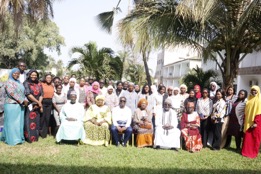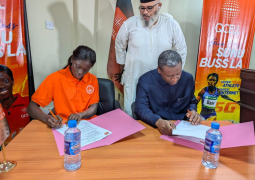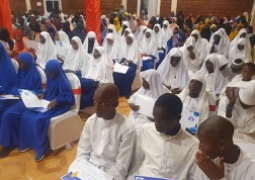
The validation, held at the Metzy Hotel, was designed to also share the findings of the survey that was conducted across tertiary and higher education institutions in the last quarter of 2024 and the strategy.
The event gave stakeholders the opportunity for the consultant to present on the barriers, challenges and status of female participation in tertiary and higher education and in leadership.
Addressing the gathering, Prof. Pierre Gomez, minister for Higher Education, Research, Science and Technology, described the occasion as historic for the industry, as it will be the first time, since the inception of the Ministry, that such a strategy has been developed as an instrument to enhance access for women in tertiary and higher education, likewise in decision-making.
He revealed that The Gambia as a nation, is still grappling with meeting its population's tertiary and higher education needs, saying according to a study published by Afro Barometer in 2023, 49% of Gambian women are less likely to have tertiary and higher education when compared to their male counterparts who are 40% less likely to access post-secondary education.
This, he said, is indeed a challenge for the government, the tertiary and higher education sector, and his Ministry.
“Thus, the initiative of increasing the participation of females in our institutions of higher learning and male-dominated fields of study such as science, technology, engineering, mathematics, (STEM) and TVET, has been, and is still the priority of MoHERST. This goal is captured as a strategic priority of MoHERST,” he said.
Prof. Gomez also said the validation of the strategy marked the beginning of possibilities for the female gender in terms of opportunities and access, thus, it is envisaged that when the Strategies are implemented, the female gender will have the opportunity to access tertiary and higher education, especially STEM.
Mucktarr M. Y. Darboe, Deputy Permanent Secretary (Technical) at MoHERST, revealed that the development of the strategy has been a collaborative effort, involving various stakeholders, including government ministries, civil society organisations, academic institutions, and development partners.
Ndeye Fatou Trawally, Deputy Permanent Secretary, Admin and Finance at MoHERST, observed that in The Gambia, as in many countries across Africa, and elsewhere, the female gender has continually faced enormous challenges.
These challenges, she said, include limited access to financial resources; lack of motivation and adequate support from the home, school, and society; unfavorable societal norms and values; early marriage; and lack of role models for young females to emulate, as there are few females in leadership positions in The Gambia.
She, however, revealed that the existence of other national frameworks, such as the National Gender Policy, the Women’s Act, and other instruments, have prepared the ground for effective interventions in the Gambia.
Thus, she said that MoHERST strongly hopes that the strategies that are being developed by the Consultant, will provide policy guide towards enhancing the situation of the female gender in the tertiary and higher education sector.



